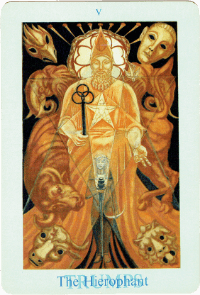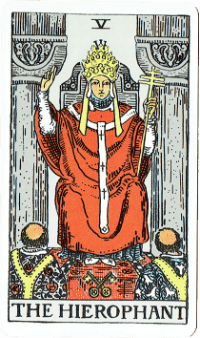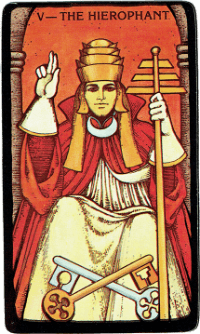easy tarot lessons
ADVANCED METAPHYSICAL LESSONS WITHOUT THE USUAL NEW AGE BULLSHIT
The Hierophant
The original point of a hierophant was that while most members of the tribe toiled for the common good of their collective, a set few would spend their days and nights laboring in constant meditation, study, research, contemplation, questioning, debate, and sharing of their findings to the rest of the group for the benefit of all.
The investment of one’s life searching out the meanings and mysteries of life, magic, and deep philosophy may sound like fun on the surface, but it is intensely demanding both physically and mentally. This is why this position in society (Pope/High Priest, Hierophant, Shaman, Council member) is so highly valued. Whereas The Magician and The High Priestess indicate internal states, skill sets, or actions, this card, and the Emperor) focus on the external, or public statements of power, control, and organization.
For complete information on this card including how to use it to manifest your desires keep reading below, or please try out a copy of The Easiest Way to Learn the Tarot—EVER!! and Advanced Tarot Secrets.
Hierophant Card Description
The word "hierophant" comes to us from ancient Greece and our favorite mother-daughter team (Demeter and Persephone—is there anything they can’t accomplish?) and the priests (female and male) who guided the faithful into the “parts holy.” If you want the long version, you are just going to have to join the mystery school, so we will simply state here that The Hierophant Card has been “Christianized” (like so many of the Tarot concepts) to reflect the beliefs popular at the time of its creation.
This card shows us a priest as an authority figure much like an emperor, rather than a guide to the divine. It shows religion as a state (system of government) rather than a path of philosophy. This is neither correct nor incorrect. It simply “is.” The monks kneeling before the power and benevolent tyranny of the Pope (the original name for this card until Waite changed it for his own uses) in this card show the importance of a central authority so important to society. This ties this card less to the ethereal (see Hanged Man, Hermit, High Priestess, Magician, and The World) than to the material. This is a card of tangible power and organization in the world, presumably under the auspices of collective wisdom, rather than force of will. This card embodies a "by the book" paradigm of logic, rather than one enlightened by intuition.
Esoteric Interpretation
The investment of one’s life searching out the meanings and mysteries of life, magic, and deep philosophy may sound like fun on the surface, but it is intensely demanding both physically and mentally. Students are taxed to the very edge of sanity, which is often where they find their greatest revelations on daily life. This position was no “life of luxury” and was an integral part of any society as they learned, preserved, and shared the collected wisdom of the tribe (village, clan, family, hamlet, community . . .).
As time progressed and religion became more structured and regimented, the ranks of “the learned” became as orderly as any government. “Good ideas” (don’t steal from your neighbor) became “laws” of society, and for all of the good this accomplished, it also entrenched religion into the very fabric of the governance of society and, therefore, religion came to be a governing body. This turned guides (priests) into overlords (priests), judges (also priests), and executioners (see Malleus Maleficarum, the Inquisition, the burning times, the Crusades, etc.).
This means that the old concepts of The Hierophant once represented have been changed prior to the card’s creation, even though it carries the old name, symbolic of the teachings mystery schools to this day seek to espouse. This makes The Hierophant dualistic and variable in interpretation (depending on one’s view of “organized religion”).
We included the history lesson to remind the student that structure can be load-bearing (a good thing), or imprisoning (a bad thing) when it comes to spirituality. “Judge not, (this card) lest ye be judged” (or something like that). When this card comes up, take a deep breath and examine everything carefully. The exact interpretation for this card will be revealed by the question you ask.
Traditional Meaning

Orthodoxy—doing things “by the book,” and only by the book. Strict regimen. Morals and dogma. Social conservatism, conformity, institutionalism, obedience to tradition. Being preached to by someone either in authority, or by someone who presumes authority.
Conversely: Professors, lecturers, priests (male or female), guidance counselors, or the act of receiving advice from any of these qualified experts. Higher education (only if aspected by supporting cards).
Traditional Reversed Meaning
The act of following tradition unquestioningly. Fundamentalism. Rule-mongering, bureaucracy, proselytization, browbeating, excommunication.
You get it FREE!
LEARN TAROT CARD MEANINGS AND
GIVE GREAT READINGS
~
`



